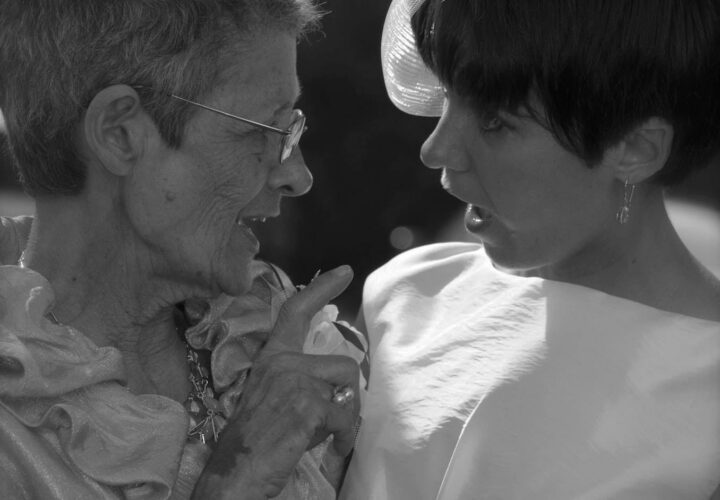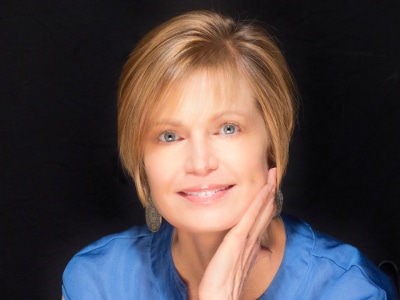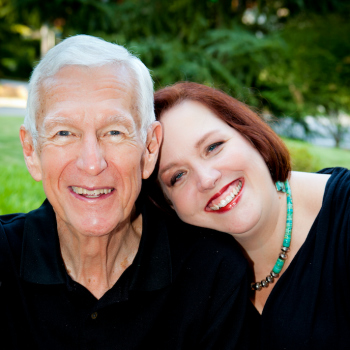“In that moment, I found myself suddenly overwhelmed by the peace that would come to our household when mom is finally at rest. I shook away the thought as quickly as it came.”
All caregivers for people with dementia reach a point when prayers are not for more time, or days of clarity and recognition. At a certain point, your prayers are simply for peace: for yourself, your household, your family, your loved one. When you reach this place, like I have with my mom, peace can only equate one thing—death.
I still remember the first time I realized that my mother’s death would come as a relief, and the immediate heartbreak that I felt. My mother was playing with my three-year-old son. He’s been her obsession since he was born, and I could rarely get a minute alone with him. She was like a shadow; wherever I was, she would be right there. As her disease progressed, I think she came to believe he was her son.
One day, as she dangled a small car in front of his face, he swatted her hand away, sternly saying “NO!” With hurt feelings and the mind of a toddler herself, she threw the car at him, and then sat on the couch and slumped back, pouting and saying that he’s a mean child, and that he learned it from the other children in the house, my stepchildren. My heart broke when I thought about how much she used to love them all.

In that moment, I found myself suddenly overwhelmed by the peace that would come to our household when mom is finally at rest. I shook away the thought as quickly as it came. I comforted my son and went about my day as if it didn’t happen, any of it: her throwing things at my child, insulting my stepchildren, and dreaming of a life without her.
In that moment, I found myself suddenly
overwhelmed by the peace that would come
to our household when mom is finally at rest.
I shook away the thought as quickly as it came.
To say that my mom’s death will come as a relief to someone who has never been on a journey like this would be like confessing my sins to the checkout clerk—it would probably make no sense, and I imagine they would look at me in disgust. However, as I’ve connected with other Alzheimer’s caregivers over the past year and found my voice while letting go of my fear of judgment, I found none of them spoke to me with disdain or disgust; rather, I was met with, “Thank you for saying this out loud,” “I feel this, every day,” and “I know exactly how you feel.”
I’ve realized that these thoughts are part of the mourning and grief process for dementia patients, which is is a long, daunting path. Every time a piece of my mother disappears, I grieve. Once the person I would run to in times of celebration and in times of sadness, now I barely recognize her. When her behavior becomes so erratic and uncontrollable that I have to keep her sedated for her own safety and everyone around her, I grieve. When I look at her and realize, again and again, that I no longer know this person looking back at me, I grieve.
Like around one-third of dementia patients, my mother’s symptoms include aggression. If I took an hour away to spend time with a friend, she would scream at me, saying I’m a horrible wife and mother. When her aggression started to get worse, the nurse told me to use the lorazepam. The first time I did, as I headed up the stairs to grab it, a fleeting thought entered my mind: Perhaps the Ativan, while keeping her calm, will help her give in to the disease that is ravaging her brain and making her more and more of a stranger I wish I didn’t know. Immediately following, another thought: “Who thinks these horrible things? I love my mom,” I reminded myself. But this is not my mom.
When I realized my mother was a stranger, it hit me like a train. I sucked in sharply and had to steady myself with my hands on the counter. My mom, the woman who raised me, who saw me at my best and worst, who applauded me and held me, who was the very definition of home, is gone.

But that’s the cruel plot twist of Alzheimer’s: She’s still sitting across from me at the table, staring at me or off into space, maybe talking about something seemingly normal, or possibly diving into the hallucinations and nonsense the disease has created in her brain, talking about treasure hunting or how the alligators are fat because they eat all the cigarettes. It’s as if she has been replaced by a carbon copy, a clone, with a whole different personality. And death—actual, physical death—becomes far less scary than the alternative: watching her transform into a stranger.
My mom, the woman who raised me, who saw
me at my best and worst, who applauded me
and held me, who was the very definition of home, is gone.
I know how bad it feels when the thought that death would be a relief slips in. I remember one particular moment clearly; it was shortly after mom was placed on in-home hospice care, and when I left to go to therapy that day (I am SO glad I had therapy that day), I lost it. In the car, in the waiting room and in my therapist’s office. And you know what the therapist said to me once I had composed myself? “I was wondering when you’d get here.” By here, she meant accepting my mom was dying, and that I was ready for it when she was. Turns out I wasn’t Superwoman, and I couldn’t stop time, or Alzheimer’s. On the flip side of the coin, I didn’t have horns and three heads either; I was merely human, doing what humans do. I was begging for release from the pain I was in, am in, will be in, until mom takes her last breath, which I intend to be there for.
I’ve come to realize that wishing for the end is a normal and natural part of the process as a caregiver when you are watching someone you love and care for dying from a terminal illness—especially one that steals them from you, slowly, over and over. The grief, what I know now is called “anticipatory grief,” is exhausting. I’m constantly bombarded by a litany of emotions, some of which I don’t believe words even exist for, and they tend to hit at the most inconvenient times: pediatrician’s office, dental chair, grocery store, pharmacy while refilling the hospice-issued lorazepam. Perhaps that’s because those are the only times I get to turn off my brain for a bit. When I’m in caregiver mode, I’m on, all the time. She comes first, no matter the consequence.
For the majority of the caregiving journey, you fantasize about the days past, when your loved one was well, and you grieve the fun you wish you could still have, the memories you long to be making instead of the ones you are being dealt. I’ve lost count of how many times I’ve taken off when my husband was home so that I could cry and scream in peace, and without fear of hurting my mom’s feelings.
When I first started thinking of life after
Alzheimer’s, I was disgusted with myself. How
could I be a good person when I’m constantly
praying for death to enter my home?
Alzheimer’s has made my mother a ticking time bomb. In the midst of deciding how to give her car to my niece, my mother suddenly broke down, blaming everyone in sight—for what, I don’t know. She told us she’s not giving the car to anyone, and then she told us she wants to blow out her brains. She was begging, aloud, to God to just take her now. She didn’t know it, but I was sending up the same prayer. This is not my mom, I remember thinking. This is not the woman who raised my sister and myself into the women we are today. The shouting continued for hours. I begged God silently in my mind to take her, right then. I begged for a massive stroke. When her social worker from hospice called, I broke down. And she came. And I’m forever grateful she did. And still, I feel no guilt for wishing for an end to this awful disease.
The last leg of this journey is so damn hard, and makes me question my sanity daily. I can’t sit here and paint a pretty picture of caring for my mother in her last days, because I’d be lying. When I first started thinking of life after Alzheimer’s, I was disgusted with myself. How could I be a good person when I’m constantly praying for death to enter my home?
With the passage of time, I’ve been able to realize that there is nothing selfish in these thoughts. They are quite selfless, if I allow myself to look at them without judgment. I am, and we all are, entitled to all of the thoughts and feelings that come with being an Alzheimer’s caregiver. And death is a huge part of Alzheimer’s—the biggest, really. At first, it’s so far off in the distance that it’s not even on the GPS, and then, as time passes, it begins to slowly emerge on the horizon. It’s kind of like driving on an open road, in a convertible, on a sunny cloudless day. Everything is OK, the car has gas, my favorite music playing is full blast. When I come around the bend, there are ominous clouds on the horizon. I pull off, and put up the top—damn, those clouds are dark.
In this vision, my mom is my ever-present passenger. In retrospect, this isn’t my journey at all. It’s hers. I’m just a driver, a first mate. I’m just getting her where she’s going as comfortably as possible. This is a chapter for me. I have more to come. For Mom though, this is her final chapter, and I’ll be damned if she sees me scared or shaken by the clouds headed our way. I smile at her, and tell her I love her.
Dark clouds still loom ahead for us. My mother is in hospice, but there is no telling how long she will last. She was diagnosed in 2011, and she’s been in the moderate/severe stage since October 2017. But now that I’ve given myself permission to have these thoughts, the dark clouds are no longer as scary. I know it’s there that she will find peace, and light will be waiting for me on the other side of the storm.





Thank you, Melissa for telling the truth! Everything I have felt, you said out loud. Prayers to you!
I so understand your feelings…I thought it would fine having my mum living with us..we’d always been so close…but it so hard, eventually one day I decided I’d use her insulin to overdose us both…but I was scared there wouldn’t be enough or that it would leave just one of us…I rang my husband,he rang our doctor,and mum was taken away to protect her…every single day after that I prayed for her to go now….I was so lucky that she knew me right to her last day..after two years her organs failed and she and I was released from our torment….it’s such a hard road to travel…this month I have been diagnosed with altzeimers…so here we go again…me and my hubby travel the road again…..
Thank you for reminding me I’m not a horrible person.
My father just passed after 4 months in hospice and he taught me life’s last lesson with grace and lucidity. You are not selfish you are asking God to bring you mother to her premenant home and out of shackles of her worldly body that can no longer go the distance that her soul desires. May God grant you peace in the coming days and months!
I often think the same – when I am mentally and emotionally exhausted. Women who know of this journey – but lost their monther to other ‘diseases or accidents’ many years ago, say to me, oh you are lucky you still have your mother. then I feel even more guilty for my thoughts. Mum says she prays every night for God to take her………..I do too. But of course, the variety of medications she is on….is what keeps her alive. there is no manual for this job as caregiver to a parent with Dementia – in whatever form. My mother is often agressive, secretative, paranoid. A huge emotional rollercoaster, with no winners. thank you for your honesty. I also write blogs on http://www.retireematters.com.au A website initially for transitioning to retirement but taken over by my raw experiences and emotions as I struggle as carer of 90 year old mum.
Please read Dr. Pauline Boss’ book, Loving Someone Who Has Dementia: How to Find Hope While Coping with Stress and Grief; it has offered a great deal of comfort to folks managing this kind of grief or ambiguous loss. I shared information about it in my discussion with Deborah Kan on Being Patient Facebook live last month.
~Lori Nisson, LCSW
So read this book. It was an audible book. It was so so good. I bought one for my 2 brothers and my daughter and asked all three to read it. I would recommend this book to anyone Who has a family member with dementia. It’s not just for the caregiver.
I lived it with my mom,when she fell and broke her hip the doctor gave us the choice of operating or not…he warned us that in her state of mind she would have to be either strapped in a wheel chair with pain killer and other meds or in bed and I remember thinking oh my God she will be screaming and trying to get out and how difficult it would be for all of us for a moment it took a hold of my mind and then I knew that my mom would not like to be in that state so we opted for pain killers ..she lasted 7 days and I still have to forgive myself for the decision have been in therapy for two years and still it kills me everytime I think about it.
Both were difficult decision but I blame myself for what we had to do…I only hope that she has forgiven me from heaven…love u mom
I opted for surgery because I knew that she would not want to be in pain and she lasted 8 days after surgery. I feel guilty because I made that decision even though I knew she was going to die sooner or later. But in my heart, I also knew that surgery was a risk. To this date, one year later my siblings accused me of killing her. I was told by three doctors to have surgery and none of them said anything. You can’t win, either way, you lose.I still feel very guilty and regrets. Sometimes I hear her saying to me that she is better off where she is becasue she is not in pain.God give us both stremgth.
you did right – i say this as my aunty had a 9 hour operation to rejoin the femur after surgery she pulled drip out, would not take any medication, would not eat – it was an absolute nightmare for family – she passed from stavation 3 months later – a terrible experience that defies words – my aunt had vascular dementia!
Unbelievably hard. One day there will be a cure. The one thing I found comfort with after my dad’s passing was that no matter what, they still respond to love. We all need love. They didn’t ask to turn out this way. Just love them in whatever way is possible. Then when they are gone, regardless of how you were feeling, you will know you did your best.
It’s called the long goodbye for a reason. The first two years with meds there wasn’t much change. Years 3 & 4 is when I realized the sweet man I married was not the man I’m married to now. We are in year 5 now and while he still knows me so many other things are confusing for him. I’m his wife/caregiver and will continue In that role because my love for him has not changed.
Alzheimers and dementia are not the only things that would cause a caregivers to guiltily wish their LO was deceased. My husband has heart disease that is slowly killing him; his anger and resentment at being in hospice at the young age of 66, even if he is unaware of the anger, are directed towards me, as his main caregiver, and also towards our daughter at times. I faced this with my mother as cancer claimed her slowly. Why is dementia and alzheimers given all or most of the attention, and other diseases that can cause death, such as heart disease and cancer, are all but ignored?
I cannot speak for anyone but myself, as the author of this article. My experience with terminal illness is Alzheimer’s. Therefore, thats the only pain I’ve had to endure. I mean no disrespect or to take away from the trials of caregivers for people living with other gut wrenching diagnoses’. I can’t even imagine what that must be like for you, and I am so, incredibly sorry for your pain, and your loss. However I will say, that this website is for Alzheimers data, stories, and research, and all of my other volunteer work/writing are in Alzheimers forums. I’m not sure how you stumbled upon my article, but perhaps it wasn’t coincidence. Perhaps its to remind us both that regardless of circumstances, caregivers struggle unimaginable pain and suffering of their own.
Melissa Price-Williams, thank you for your honesty. I am at the end of my mom’s dementia , I hope, and like you, felt so dang guilty today when I told the nurse I just wish she would die. She is in pain and living in a care home. I always feel like I need to oversee her care ( I’m retired nurse) . I immediately came home and called my therapist. I have some decisions to make. Love her so much, but am becoming a toxic caregiver with guilt, irritability, just plain nutty behavior that my husband tries to understand..
Thank you for your incredible honesty, Melissa. I remember my days as a caregiver well. You are giving such a blessing, and there will be life after caregiving.
Just Thank you!!!!!
thanks to all the comments and the article …my mom just past at 90…double incontinence ..blind
dementia……colon tumor….I satin the hospital praying to God to take her…xxx
Melissa, well done on writing such a raw and honest piece. My mom passed away last Thursday after an eleven year fight with dementia – I asked many many times in the last year for her to be taken. She’s no longer suffering and she’s in a place where Alzeimhers does not exist. Both she and I are at peace now. I wish you strength and relief in your final journey with you mum – you deserve it. X
Thank you Melissa,
My mom also became a whisper of herself.Once a stunning,brilliant creative and highly respected woman ,art collector and patron of the arts.She slowly dissapered.
In the beginning her illness was a mix of hallucinations ,seeing babies and animals running around her.As her condition grew worse she became agitated,angry,frustrated and forgetful.After a year into her illness her two sons,my brothers died within weeks of each other.
The pain and horror for us was overwhelming.
My older brother had cancer.My other brother after attending my other brothers funeral Died suddenly of an aneurism.The culmination of so many tragedies coupled with my mom’s illness was unbearable.
The beauty of Alzheimer’s was that my mother forgot my brothers deaths and had many hours of conversations and daily visits with my brothers.Although they were gone they were with her daily.
Melissa spoke of anticipatory death.I too was hoping in a way for that.My mother also had melanoma and her physical condition was devastating.I had never seen anything as frightening physically.
I had caretakers in a nursing home. To help .My mother lost ability to walk,stand or move her arms.
This phase lasted 3 years and she slowly vanished daily.Days she new me was validating when she was not angry.
My mom passed away January 3,2019.
I did not feel her presence.I believe she was catapulted to the other world.
I feel guilty I can’t miss her.
I try to remember days gone by.
I feel hollow…
I am grateful to her for her extraordinary life she gave me.
But have not really been able to grieve.
sending best wishes to you i lost both parents and a sister in the last two years. i believe my mom had undiagnosed dementia along with the cancer that killed her. 2 years in i can say i am starting to beginning to really grieve and it feels right. i know there will be a brighter time coming, and meanwhile i am valuing each day, and finally crying a lot.
Thank you for sharing with such honesty. What an encouragement it is to me. My parents moved in 7 months ago, my dad in the last stage of cancer, dying a month later. Immediately I’ve become my mother’s caregiver. She has had dementia for several years and now is moderate to severe. Having watched my dad die for a year and a half and now watching my mom die, maybe not physically, but emotionally and loosing her memories at times seems overwhelming. Your words reminded me I’m not alone.
Thank you for this honest account. I’m miserable and feel terrible at how much I hate my mother. She’s mean, awful, and negative and I wish it was over. I e been honest with my dad and let him know that my quality of life and my sanity are suffering and that she either needs to go to a facility or he needs to get more help. I feel like I’m dying taking care of her. I want this to be finished. The saddest and happiest day of my life will be when we place her in a facility. After 7 years of this, I am a wreck. Thank you for sharing your feelings. It helps me feel less alone.
Thank you for sincerely spelling out your suffering and needs. I’m 81 and still OK, but I hear of others that aren’t and know that many suffer this problem of being the caregiver. I think we all must realize that the caregivers need people to care for them! I admire all of you so — and hope you realize that you do not need to feel guilty over situations such as you are living. You also have family to take care of — and yourself. God understands, and only He knows why you are being put to this extreme test of love and caring. He will walk it with you.
I cried reading this.
Everyday I pray that my 93 year old mother has the gift of leaving this planet and suffering behind. I an overcome with guilt but I,too, want my life back after 2 1/2 years of caregiving.
Thank you
Wow, I really needed to read this. I realize I’m 3 years late to this article but having just lost my mother to dementia a few days ago, I needed the affirmation that I’m not alone in what I’m feeling. I slowly and sometimes rapidly lost my mom for years. Dementia ate away at her and her last months and weeks were torturous for everyone. All I could do at the end was pray that God would heal her in heaven and take away this earthly pain for her and all involved. I have felt more relief than grief in the days since and only someone who has walked a path like this would truly understand. Thank you for your transparency and honestly-it truly helped me.
Your comment really resonated with me – especially as I struggle with my feelings for my mother’s (with dementia) death just a week ago. I have such conflicting feelings – mostly of relief – and am struggling to find grief – as I feel I have been grieving her for years as I watched her slip away.
Yes. Thank you all for sharing your stories. My Dad died of Dementia just a couple of weeks ago. I remember praying to God that He would do what was best even it that meant that my Dad had to die. It was during that night that I got the dreaded 2 AM phone call from the hospital where I had just taken him in the past week. Caring for him for the past 3 years had caused me such stress and anxiety that my blood pressure had risen to near stroke levels. My Dad was suffering and had told me that he wanted to die. I had prayed a similar prayer on behalf of my Grandmother when I was 17 and for my Mom when I was 41. Now 58, it was hard to accept but I praise God that in all 3 cases, He did what was best for them as well as for all of us.
This is a part of the caregiving and dying process that nurses, doctors, social workers do not talk about. As a result most who get to the stage of death bringing feelings of relief, do not speak about it. Suffer alone with the hurt, guilt, feeling inadequate, not “stronger”, more compassionate, loving…
You’ve helped many by putting these thoughts and feelings to words.
Anyone reading this can see and knows for themselves, caregivers do from a place of love. Pray, hope, make decisions from a place of love. Most of us have to balance the needs and wants of our terminal loved one along with other responsibilities to ourselves, work, family. In death, everyone gets to where they need to be. That is a blessing.
Stay courageous caregivers! No one knows better than you. No one!
Rosie, I wish you peace. I watched dementia wind it’s way through my family. Right now it is my mother’s turn. Unless there is a cure, I am pretty sure I will be next. I understand, oh, so well.
i am home caring my husband who has advanced complex 12 years now – he remains home so no one can hurt him and because i want to be with him – i am struggling to keep my vow however as he fights me now re showering -going to bed – clean clothes – changing sodden pullups – i dont have much help – no family – i pay a girl to take him for an hour walk in afternoon (to try to stop sundowning) – and a retired registered nurse has started recently to give me 4 hours on mondays off -she is helping me with his showering as well but that can take up to 2-4 hours as medications do not seem to affect him ! i will not be allowing any treatment of a surgical nature to prolong his life as terrible as it sounds – it is no quality for him in this state! or me! or our little dog! selfish ? or realistic?
My mother’s 95th birthday is one month from today. Next week my son-in-law will have a pacemaker implanted. He is 35. Someone please explain this to me, because I don’t understand this at all.
Robin, I know exactly what you mean. My father will be 91 next month. He has moderate vascular dementia. Two years ago I moved in with him to care for him, with the help of my sister. Then my brother in law was diagnosed with lung cancer, had an operation and is fortunate to be in the clear so far. Meanwhile, my sister became poorly and was diagnosed with late stage pancreatic cancer. Seven weeks later she died, aged 59. My dear dad keeps asking when he will see her again, I just reply, soon dad, she’s a bit busy at work . I always thought that my sister and I would grow old together. None of this makes much sense to me. Life is chaotic and often not what we expect or plan for. I try to find the positives in everyday life, even just little things. I walk alot with my dog and do moderate exercise, it helps. Even though you dont understanding thing’s, I hope you find a way to embrace what’s happening in your life and focus on the positives.